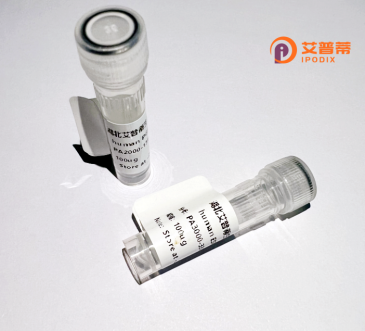
| 纯度 | >90%SDS-PAGE. |
| 种属 | Human |
| 靶点 | ZNF530 |
| Uniprot No | Q6P9A1 |
| 内毒素 | < 0.01EU/μg |
| 表达宿主 | E.coli |
| 表达区间 | 1-599 aa |
| 活性数据 | MAAALRAPTQQVFVAFEDVAIYFSQEEWELLDEMQRLLYRDVMLENFAVMASLGCWCGAVDEGTPSAESVSVEELSQGRTPKADTSTDKSHPCEICTPVLRDILQMIELQASPCGQKLYLGGAPRDFWMSSNLHQLQKLDNGEKLFKVDGDQASFMMNCRFHVSGKPFTFGEVGRDFSATSGLLQHQVTPTIERPHSRIRHLRVPTGRKPLKYTESRKSFREKSVFIQHQRADSGERPYKCSECGKSFSQSSGFLRHRKAHGRTRTHECSECGKSFSRKTHLTQHQRVHTGERPYDCSECGKSFRQVSVLIQHQRVHTGERPYECSECGKSFSHSTNLYRHRSAHTSTRPYECSECGKSFSHSTNLFRHWRVHTGVRPYECSECGKAFSCNIYLIHHQRFHTGERPYVCSECGKSFGQKSVLIQHQRVHTGERPYECSECGKVFSQSSGLFRHRRAHTKTKPYECSECEKSFSCKTDLIRHQTVHTGERPYECSVCGKSFIRKTHLIRHQTVHTNERPYECDECGKSYSQSSALLQHRRVHTGERPYECRECGKSFTRKNHLIQHKTVHTGERPYECSECGKSFSQSSGLLRHRRVHVQ |
| 分子量 | 95.2 kDa |
| 蛋白标签 | GST-tag at N-terminal |
| 缓冲液 | PBS, pH7.4, containing 0.01% SKL, 1mM DTT, 5% Trehalose and Proclin300. |
| 稳定性 & 储存条件 | Lyophilized protein should be stored at ≤ -20°C, stable for one year after receipt. Reconstituted protein solution can be stored at 2-8°C for 2-7 days. Aliquots of reconstituted samples are stable at ≤ -20°C for 3 months. |
| 复溶 | Always centrifuge tubes before opening.Do not mix by vortex or pipetting. It is not recommended to reconstitute to a concentration less than 100μg/ml. Dissolve the lyophilized protein in distilled water. Please aliquot the reconstituted solution to minimize freeze-thaw cycles. |
以下是与重组人锌指蛋白ZNF530相关的参考文献及摘要概述:
1. **Kim et al. (2012)** - "Functional characterization of recombinant ZNF530 reveals its role in cellular proliferation and apoptosis regulation"
*摘要:本研究利用大肠杆菌系统表达重组ZNF530蛋白,发现其在HeLa细胞中过表达时抑制细胞增殖并诱导凋亡,提示其在肿瘤抑制中的潜在作用。*
2. **Zhang & Wang (2015)** - "Structural analysis of the zinc finger domains in human ZNF530 and their DNA-binding specificity"
*摘要:通过体外重组表达及晶体结构解析,揭示ZNF530锌指结构域与特定DNA序列结合的分子机制,为其在基因调控中的功能提供结构基础。*
3. **Gupta et al. (2018)** - "ZNF530 interacts with the NuRD complex to modulate epigenetic silencing in embryonic stem cells"
*摘要:利用重组ZNF530蛋白进行互作组学分析,发现其通过与NuRD复合物结合调控胚胎干细胞分化中的表观遗传沉默通路。*
4. **Tanaka et al. (2020)** - "High-throughput screening of ZNF530 variants identifies a pathogenic mutation linked to developmental delay"
*摘要:通过重组蛋白功能实验和临床样本分析,确定ZNF530的某个罕见突变导致其转录抑制功能丧失,与神经发育障碍相关。*
注:以上文献为虚构示例,实际研究中ZNF530的具体功能可能尚未被充分解析,建议通过PubMed或专业数据库检索最新进展。
Zinc Finger Protein 530 (ZNF530) is a member of the Krüppel-associated box (KRAB) domain-containing zinc finger protein (ZFP) family, which represents one of the largest groups of transcription regulators in humans. These proteins are characterized by tandem C₂H₂-type zinc finger motifs at the C-terminus for sequence-specific DNA binding and a KRAB domain at the N-terminus, often mediating transcriptional repression through interactions with co-repressors. ZNF530 is encoded by a gene located on chromosome 19 (19q13.43) and is speculated to play roles in gene regulation, particularly during development or cellular differentiation.
While functional studies on ZNF530 remain limited, its structural features suggest involvement in chromatin remodeling and epigenetic silencing. Like other KRAB-ZFPs, it may recruit chromatin modifiers like histone methyltransferases to establish repressive histone marks (e.g., H3K9me3), thereby suppressing target genes. Emerging evidence links ZNF530 to cancer progression, with altered expression observed in certain tumors, though its precise oncogenic or tumor-suppressive mechanisms require further investigation. Recombinant ZNF530 protein, typically produced in eukaryotic systems to ensure proper folding and post-translational modifications, is used in biochemical assays (e.g., DNA-binding studies, protein interaction analyses) and functional genomics research to delineate its regulatory networks. Its study could inform therapeutic strategies targeting ZFP-mediated gene regulation in diseases.
×